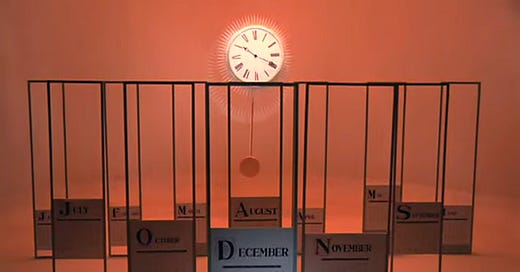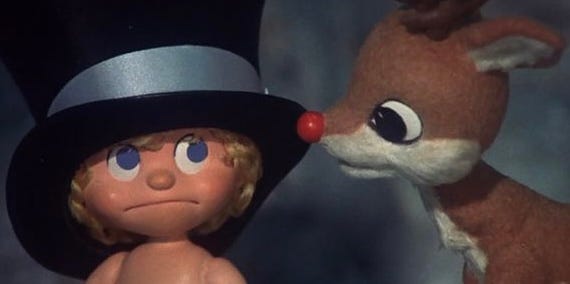Time, Mortality, and Red-nosed Reindeer
The Hidden Philosophical Message in Rudolph's Shiny New Year
It’s New Year’s Eve, and what better way to ring in another year in this dystopian hellscape than with Rudolph's Shiny New Year (1976), the craziest clusterfuck Rankin/Bass ever produced (with the possible exception of Rudolph and Frosty's Christmas in July—I haven’t seen it in a while). Much like the year we’ve had, this hot mess of a stop motion TV special is confusing, chaotic, and creepy, and it leaves you feeling dead inside.
The plot is overly complex, as if it was originally four or five longer stories that got chopped up and reassembled into one hour-long nonsensical fever dream (I won’t try to explain it here because…well, I can’t), and then they tacked on Rudolph at the last minute to capitalize on the character’s popularity. It's full of plot holes that leave you with unanswered questions, like:
Why in god's name couldn't Rudolph fly wherever he needed to go instead of sailing, riding a slow-moving camel, or actually jumping inside a whale’s mouth without a second thought?
Why in the world is an island frozen in the year 1023 populated by fictional fairy tale characters?
Why the fuck can’t Father Time pronounce “archipelago” correctly but a literal caveman can?
What exactly is the year “19-Wonderful?” Is it like “19XX?”
And why oh why are we supposed to accept that people who point and laugh at a small child’s big ears aren't being mean and insensitive the way the other reindeer who laughed at Rudolph's nose most certainly were?!
The songs are boring, and most bear only a tenuous—if any—connection to the story, as if Rankin and Bass were pressed for time and just used some random songs they had lying around. (e.g. Rudolph is in a hurry to find the Baby New Year by midnight, but he has time to stop and listen to OM serenade him with “It’s Raining Sunshine” for absolutely no reason?)
The characters aren't likable or even cute, and the talents of Morey Amsterdam (One Million aka “OM”) and Frank Gorshin (Sir “Ten-Two-Three”) are completely wasted on characters with so few lines and so little to contribute that they might as well not even be there.
Even The Leprechauns' Christmas Gold is more entertaining. At least it has catchy songs.
But hidden within this bizarre, convoluted oddity is a surprising exercise in existentialism disguised as a lighthearted musical number: "The Moving Finger Writes." Sung by Father Time (Red Skelton), this song softly expounds on the futility of time's endless march and the peace of accepting one's own mortality using a line from Rubaiyat by Persian scientist and poet, Omar Khayyam.
Here’s an excerpt from Khayyam’s original poem, including the line in question:
The Moving Finger writes; and, having writ,
Moves on: nor all your Piety nor Wit
Shall lure it back to cancel half a Line,
Nor all your Tears wash out a Word of it.And that inverted Bowl they call the Sky,
Whereunder crawling coop'd we live and die,
Lift not your hands to It for help—for It
As impotently moves as you or I.With Earth's first Clay They did the Last Man knead,
And there of the Last Harvest sow'd the Seed:
And the first Morning of Creation wrote
What the Last Dawn of Reckoning shall read.YESTERDAY This Day's Madness did prepare;
TO-MORROW's Silence, Triumph, or Despair:
Drink! for you know not whence you came, nor why:
Drink! for you know not why you go, nor where.
It seems as if both the song and the poem are preaching the same message: Time goes on whether we like it or not, and there’s no telling what fresh hell it will bring, so we must make the best of it while we can.
In other words: Enjoy yourself, it’s later than you think.
With that in mind, perhaps the frenzied, disconnected feel of this story is a key to unlocking its deeper meaning, as is the irony of a complicated, sweeping narrative about the essence of time being compressed into a one-hour TV time slot when it might have actually made some sense if it was spread out over two or three—maybe even four or five. Perhaps there is method in its madness. Perhaps its creators were telling us to let go of that which we can’t control and joyfully embrace the absurdity of life.
Then again, maybe the story has no meaning at all, and the message it’s trying to convey is more nihilist than existentialist: Nothing makes sense and nothing matters, so fuck it. Take Omar Khayyam’s advice and have a drink.
Here’s hoping you and yours have a happy, have a happy, have a hap-hap-happy new year.
And, as Rudolph observed, “may it be shiny too.”
(Ugh)





